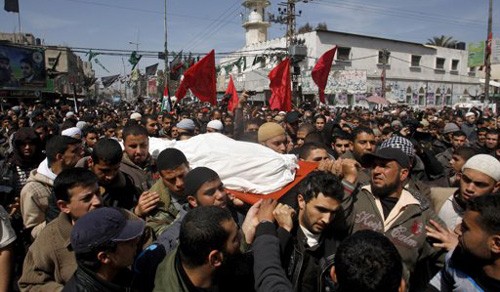(VOVworld) A “comprehensive and mutual” truce has been agreed between Israel and Palestine after four days of fierce violence. The cease fire followed Egypt’s effort to broker a deal to calm military conflict in the Gaza strip.

Israel's air strikes on the Gaza Strip killed scores of people (source: AP)
|
UN General Secretary Ban Ki-moon chaired a meeting on Monday with representatives from the US, Russia, and the EU to seek a peaceful solution for the Middle East. US Secretary of State Hillary Clinton, Russian Foreign Minister Sergei Lavrov, High Representative of the European Union for Foreign Affairs and Security Policy Catherine Ashton, and special envoy to the Middle East Tony Blair joined the discussion. They focused on core issues relating to Israel and Palestine including territory, security, refugees, and a negotiated way to set up a Palestinian state and end Israel’s occupation since 1967 of Palestinian territory.
Just a few days ago, there were no optimistic signs in the Gaza Strip. Tel Aviv launched a massive air strike on the Gaza Strip to retaliate against Palestinian’s firing 100 rockets and mortars at Israel’s southern region of Eshkol, wounding 4 people. Israeli Prime Minister Benjamin Netanyahu said Israel will strike any armed force that plans to attack Israelis. From March 9th to 12th, Israel’s bombing killed at least 20 Palestinians and injured more than 30 others, the fiercest violence in the last 30 years. On Sunday, Israel sent a message to the UN Security Council criticizing the international community for ignoring shelling from the Gaza Strip. Meanwhile, Palestinian Ambassador to the UN Riyad Mansour asked the UN Security Council to act immediately to end the crisis and blamed Israel for the escalating violence.
The truce is an initial ray of hope for peace in the Middle East after one year of impasse, due mainly to Israel’s continuous expansion of settlements in Palestinian territories. Palestine considers evacuation of the Israeli settlements the prime condition for further negotiation.
But the truce is a positive sign on a shabby basis. It will be a success if both sides can build mutual trust, which observers say is very unlikely right now. There are also disagreements within the Palestinian authority. Representatives of the Hamas and Fatah movements have so far failed to implement the agreement to form a unified government signed in Doha, Qatar, last Tuesday, due to disagreements on security and the right of self-determination for each side. Early this month, Palestine passed a message to Israel via Jordan repeating their conditions for resuming negotiations: a two-state solution based on the 1967 border demarcation, and a complete halt to the construction of Jewish settlements in disputed areas including East Jerusalem. Observers say Israel will hardly accept these conditions.
The public still hopes that the new truce and renewed international effort will get the peace process back on track.
Anh Huyen